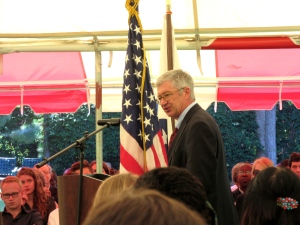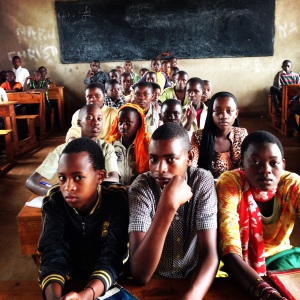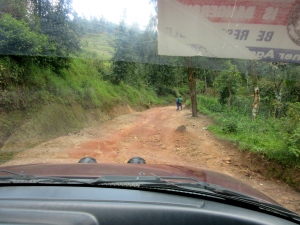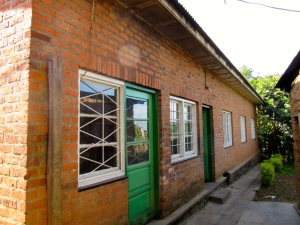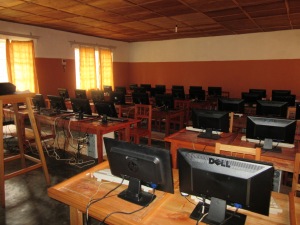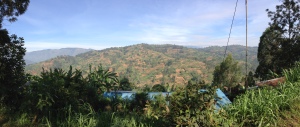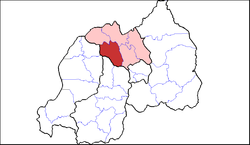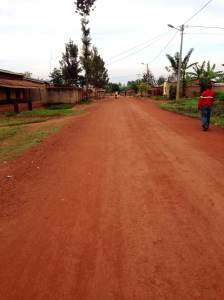Hi there. It’s been a while, huh? During my parents’ recent visit to Rwanda, they convinced me to attempt to resuscitate the blog effort. So I figured who better to kick it off than my greatest fans and cheerleaders, who can now give a little glimpse of my life here from their perspective. So here are some of their thoughts and impressions during their two-week stay in Rwanda… Enjoy!
We just returned from visiting Sarah in Rwanda for a couple of weeks! We spent three days in her village with her and then we all traveled around doing some sightseeing. We had an amazing experience on our journey! We met so many nice, interesting people and saw so many incredible things that it is hard to put everything we experienced into words. We were trying to think about a way to organize our post and thought back to how, as we traveled around the country, we kept thinking how GRATEFUL and APPRECIATIVE we were for various things that happened along the way. So, the “theme” of our blog post is going to be “Ten Things We Are Grateful and Appreciative For on Our Trip to Visit Sarah in Rwanda!”
#1 – The Opportunity to Spend Time With Sarah! – Since Sarah left for Rwanda in September, communication with her has been a little challenging because she is in a remote location and the internet and phone signal there is not very strong. Leaving the country and going 7500 miles away to live for a couple of years is a big deal, so it was wonderful to see her and talk with her and know with certainty that she is doing fine!
#2 – “Sarah’s School is Cool” – Sarah is extremely fortunate to be working in a very good school where the students are focused and hard workers. When we got to her village, Jean Bosco the Academic Master made a point of coming to visit us and welcome us to the school. Later, we met Father Alphonse, Sarah’s Headmaster, and he was great! He has been very kind and supportive of Sarah and told us she is doing a commendable job! We had the opportunity to meet all of Sarah’s classes as they received their final exam scores, and they are really nice kids–kind, respectful, and sweet. They like Sarah and appreciate the help she is giving them with their English lessons.
We were even able to do a little teaching while we were there, too. Sarah sponsors both boys and girls leadership clubs at the school which are called BE (Boys Excelling) and GLOW (Girls Leading Our World). We taught the girls how to make woven rubber band bracelets and Alan brought 3 basketballs and 2 nets to teach a basketball clinic for the boys. The girls had a BLAST making the bracelets. They wove bracelets until there were no rubber bands left (and we brought 4,000 rubber bands)! The basketball clinic was equally successful, as Alan had over 50 kids show up (and some girls, too). We really had a lot of fun with the kids and found the students to be very patient and appreciative whenever they needed help. The bottom line is that kids are kids no matter where you are in the world, and if you are a teacher and you enjoy working with kids, there is nothing better than working with a group of kids who want to learn what you want to teach.
#3 – Sarah has Made Some Nice Friendships With People in Her Community! – We had the opportunity to meet many people Sarah interacts with in her community on a daily basis and they are very nice and supportive. From the lovely young couple who own her house and have an adorable two-year-old daughter to the group of nuns who run the primary school/boarding school in the village, Sarah has definitely made some good friends. She is working with some people in the village on the Community Finance Initiative in partnership with an entrepreneurship teacher at her school named Sylvere and three groups of people from the community who are learning how to start small income generating projects through the program. She is also working with the Sector Education Officer, Theophile, and a committee of teachers and people from the village to create a public library for the village. When we were walking through the village with her, even the little lady selling vegetables gave Sarah a hug. Sarah also told us a story about how a while ago, she needed to buy some charcoal for cooking but she couldn’t find any in the shops. When she was in the village she mentioned it to a few people, and a few days later a bag of charcoal magically appeared at her door! That makes us feel good that the community is looking out for her.
It is also such a fun thing to hear Sarah chatting with people in Kinyarwanda, the language that is used around the country. It’s interesting because when were were out and about, people are always genuinely surprised and amused that she can “talk the talk.” (It comes in really handy at the market!). We think they also really respect that she is working to learn their native language.
#4 – “The Land of a Thousand Hills” is Really Pretty ! – After we left Sarah’s village, we traveled to Volcanoes National Park and went gorilla trekking. That was truly an AMAZING experience to be quite literally hanging out (literally, we were on the side of a mountain) with the “Agashya” family of gorillas. Believe it or not, they are so accustomed to visitors that they really didn’t seem to care at all that we were there. Then we went to Lake Kivu for three days, which is this massive lake that runs along the western border of the country. Then it was off to an incredible rainforest called Nyungwe National Park. We were constantly treated to some spectacular scenery while driving and walking through the countryside!
#5 – Sarah’s Peace Corps Co-Workers Are a Great Bunch of Kids! We had the opportunity to spend some time with several of Sarah’s Peace Corps friends as we traveled, and it was very nice meeting them and seeing them interacting together. They are a real support and help to each other and it was obvious when we were with them that they REALLY enjoy being together. Even though they are not in close proximity with each other, they communicate a lot via phone and whenever the Peace Corps has trainings and meetings. We are sure they are a great source of companionship and fun for each other!
#6 – Furthermore, The Adaptability of These PC Workers – Rwanda is a great place with a lot of potential, but the daily life for most people in the rural areas is MUCH harder than our life here in the States. Think about getting through the day without things like stoves, microwaves, running water in your home, flushing toilets, dishwashers, refrigerators, washing machines, electricity, etc. We are so impressed how the volunteers learn to live the same way as the people they are serving and can adapt to these changes quickly and for long periods of time. Flexibility and adaptability are SUCH essential life skills, and we are so appreciative of everything they are learning to do differently and for everything they are doing to help people and make a great representation of the United States!
#7 – The Resiliency of the People – As I mentioned in #6, everyday life is Rwanda is much, much harder than it is at home and people don’t have a lot of “stuff.” But, the people just seem to go with it, and they get done what needs to be done with whatever is on hand. Rwandan people seem to be very creative and innovative with the materials they find around them. The people we met also had a very strong faith, and they really value education and hard work. I can also see this resiliency in how the country has come so far after the genocide, which was now over 20 years ago. The people continue to try to forgive, reconcile, and move forward—truly amazing and humbling!
#8 – We Made It There and Made It Back and We Are Fine! – We never traveled this far away from home, and there was a lot of prep work we had to do to be able to get there, and to help things run smoothly once we were there. We are so grateful and relieved that we got there, had a great time, and got back home safe and sound.
#9 – The Prayers and Support of All Our Friends and Family! – We are SO SO grateful (truly beyond words!) to everyone who had remembered Sarah and us in their prayers, and sent positive energy and good thoughts our way. We know it is helping Sarah and us, and that it has had a huge positive impact on our lives! Please keep Sarah especially in your thoughts as she continues on her journey!
#10 – Sarah –We are so grateful for Sarah and so appreciative of the wonderful person she is! We love more than anything and we are so proud of her. We love you with all our hearts, tootsie! : ) .
So, there you have it!
